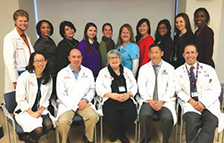One of the Nation's Largest Heart Transplant Programs
NewYork-Presbyterian has a rich history of developing innovative surgical treatments that set the standard in pediatric cardiac surgery. In 1984, our surgeons performed the world’s first successful pediatric heart transplant in a 4-year-old boy. In the intervening years, more than 500 children have received new hearts at NewYork-Presbyterian Morgan Stanley Children’s Hospital. Today, NewYork-Presbyterian is one of the largest and most successful pediatric heart transplant centers in North America and the world – largely due to the dedication and expertise of our heart transplant team, the use of ventricular assist devices (VADs) in managing heart failure, and the application of novel immunosuppression protocols. Notably, we have the most pediatric experience in the U.S. with the PediMag (Levitronix) device. Our use of pediatric VADs has increased year after year.
Our cardiovascular surgeons perform 25 pediatric heart transplants every year

NewYork-Presbyterian Morgan Stanley Children’s Hospital multidisciplinary transplant team.
Extracorporeal Membrane Oxygenation (ECMO)
ECMO is a short-term cardiac assist device for the very young, or for children whose anatomy will not permit a ventricular assist device (VAD). The Center’s physicians participated in the earliest development of ECMO, making our facility one of the first in the world to use this lifesaving technology successfully in neonates and children. We are an ELSO (Extracorporeal Life Support Organization) Center of Excellence, and have an ECMO transport program to move patients from outside hospitals into ours.
Blood Conservation Techniques
For the vast majority of procedures in neonates or small infants, transfusion-free cardiac surgery is unrealistic. However, we have made considerable progress in limiting the need for blood products with simple and safe techniques that involve a decrease in cardiopulmonary bypass prime volume, such as making the heart-lung machine smaller and less injurious.
Every participant in our program, including cardiologists, anesthesiologists, perfusionists, surgeons, intensivists and laboratory technicians, is committed to blood conservation in pediatric cardiac surgery.



